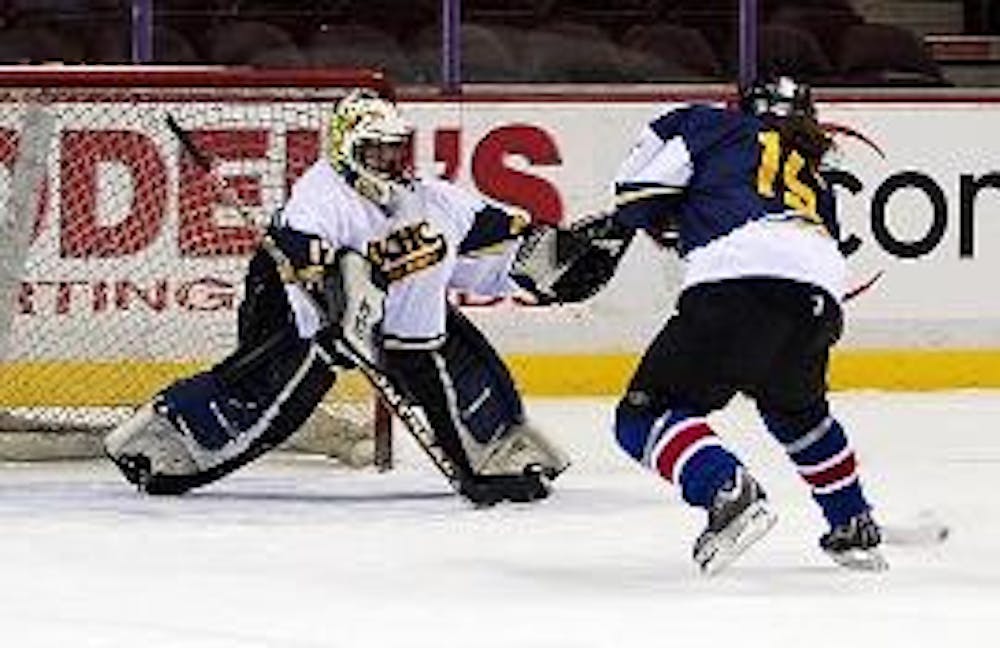All winter long, the AU community faithfully followed the rise of the men's basketball squad as it fought all the way to the NCAA tournament. But there are other teams that are part of AU Athletics that do not garner as much attention. Then there are club teams that receive almost none.
The AU women's ice hockey club practices, travels and takes on rival schools just like the varsity teams, but it endures the added challenge of trying to make ends meet.
Monetary risk is the club's biggest worry by a long shot. It can cost up to $28,000 a season to operate the team, offset by fundraising, dues and a $4,000 boost from the university. But the true underdog spirit is felt within the squad, which has to face many obstacles just to exist, said team President Alicia Krawitz, a graduate student in the School of Public Affairs who has been with the team since her junior year as an undergraduate.
The 2007-2008 season also brought change for the club when it moved to a new site for home games - the brand new Kettler Capitals IcePlex in Arlington, Va. The site is used by the Washington Capitals for practices.
"We took a huge monetary risk in moving our games to the new Capitals practice facility in Arlington," Krawitz said. "It's Metro accessible, easier to get to and we really hoped that would get more fans."
Balancing the budget is only one of the factors that Krawitz deals with as the club's president, a position that she has held since her first year with the team.
"A month after I started with the team, a month after I ever started playing ice hockey, they asked me if I'd be president," Krawitz said. "I said sure since the previous one didn't seem to have much to do."
She takes on a broad range of duties in running the team, things that players typically would not need to be concerned with.
"I planned rides to and from practice, did all the reports due for club sports, sat in on club sports-related meetings, found teams for us to play, booked ice time, talked with rink managers, booked hotels, organized fundraisers," she said. "And I'm sure there's more."
Krawitz came to AU as a field hockey recruit but was cut from the squad following her sophomore year. She took the opportunity to pick up ice hockey.
"I realized I had always wanted to play ice hockey, and I finally had the chance," she said.
The team plays its matches from October until February and competes in the Delaware Valley Collegiate Hockey Conference, a subdivision of the American Collegiate Hockey Association. The team practices twice a week in the Fort DuPont area of Southeast D.C.
"It's very structured," said Meredith Tomeo, a sophomore forward in the College of Arts and Sciences. "It helps playing in a structured league with two coaches."
The women's hockey team, which claimed first place in the league a year ago, came into the 2007-2008 season knowing they had an uphill climb on their hands, according to Tomeo. The squad had lost a handful of key players, and some would be studying abroad. There were also several freshmen on the squad who had never played the game before.
"Hockey isn't the easiest game to pick up on, and then you realize you have to do everything on skates," Krawitz said.
But this challenge served as a way for the older teammates to bond with the new members of the team.
"It was great teaching them and helping them," Tomeo said. "They were really excited to learn how to play, and they picked it up fast."
As the club's season progressed, the team put together a strong group effort to emerge third out of five teams in the league.
"It was kind of a rebuilding season," said Emily Schulte, a sophomore goaltender in the School of International Service.
Given the nature of club sports, there is no real dominance displayed by any one program over an extended period of time. In the DVCHC, featured schools like AU, University of Pennsylvania and the University of Maryland, College Park, tend to play at a fairly even level talent-wise.
"The teams were very balanced this year," Tomeo said. "Therefore, it was more fun."
All teams play each other twice during the regular season. With some teams, there is the added touch of friendly rivalry involved.
"We are pretty friendly with [University of Maryland, College Park] since we share a bus," Tomeo said.
But the true underdog spirit is felt within the squad, which has to face so many obstacles just to exist.
For Krawitz, who will leave the team when she finishes graduate school, that fight will be missed.
"It's all beer leagues for me now - I am going to miss playing for something," she said. "It's a great group of people, and always being the underdog team in terms of always struggling to make it by was kind of motivating"





